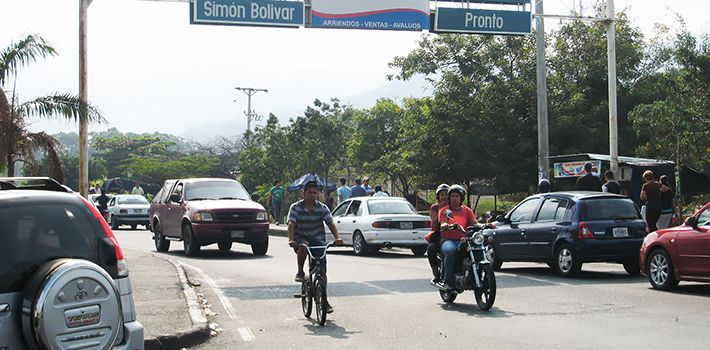
EspañolThe Venezuelan government has become increasingly invested in, and blinded by, their totalitarian path. They do not understand, nor apparently want to understand, their role in the economic disaster that has occurred in this oil-rich land.
This time, in an attempt to combat the rise in contraband being smuggled across the border, the Nicolás Maduro administration has decided to shut down the border between Venezuela and Colombia every night.
The satrap’s logic is simple (and wrong): goods smuggled into Colombia are causing the shortage in Venezuela.
According to Maduro, the shortages have nothing to do with the lack of private property rights, currency exchange and price controls, and trade restrictions imposed by the former tyrant Hugo Chávez. Maduro ignores the economic policy that has led to the disappearance of nearly all industry in Venezuela, including food production.
Drunk with power, the Venezuelan government once again points the finger at trade. Trade that has been outlawed by the state, and is therefore called smuggling.
It’s quite clear that these leaders prefer reading pamphlets disguised as science, typical of Karl Marx and his followers, instead of books that explain what’s going on today, like Friedrich Hayek’s The Road to Serfdom.
However, the Chavista government’s ability to implement such a simplistic, misguided, and harmful solution is not a one-way street. Across the border, the Colombian government conceded the closure, without protest, and without regard for the individual rights of the Colombian people.
Colombian Foreign Minister María Angela Holguín, who becomes very understanding when the totalitarian regimes of the region are involved, explained that the new policy will not affect the border zone because the closures will only occur at night. In other words, she believes herself to be omniscient, knowing how and when commercial trade takes place along the Venezuela-Colombia border.
When the Venezuelan government cracked down on peaceful demonstrators, the Colombian government provided its tacit approval through its silence. Now, it allows the Venezuelan government to enact policy that will affect traders and businessmen of the border zone, who must now only work during the hours the minister considers convenient.
Even with the consent of Colombian authorities, this policy will fail. Are governments on either side of the border really so ignorant and naive as to think people will resign themselves to their fate and cease trading between the two countries? Are they really so blind that they do not realize that the cause of shortages is not cross-border smuggling but bad economic policy?
Worst of all, when this policy does fail after a month, the Venezuelan government will then surely react in one of two predictable ways, if not both.
First, they will affirm that the policy was, in fact, a success, but need more control to fully root out the problem. Then, they will break out the annoying rhetoric that by now everyone is quite accustomed to hearing, and blame the “capitalists” and the “bourgeois,” denouncing the United States and their “intervention” for their own failures.
The Venezuelan government will likely apply more restrictive trade policies and continue destroying individual liberties and property rights. To divert attention, the government will announce that the policy will need to be extended, both in duration and for longer periods of time each day.
For quite a long time now, the Venezuelan government has been its citizens’ own worst enemy. Over time, it has increasingly become a threat to regional stability and the welfare of citizens in neighboring countries.
Unfortunately, the citizens of other nations, like Colombia, are not being protected by their own governments, which instead dedicate themselves to serving as accomplices to totalitarianism. In Colombia, this complicity is led by the Juan Manuel Santos administration, which naively believes that angering the Venezuelan tyrant may endanger their tangled peace process.
If the Colombian government is able to arrange a peace agreement with the FARC, it will hopefully not come at a greater cost to the government’s legitimacy, stability, and resources, having permitted and aided in the violation of its own citizens’ rights.
 Versión Español
Versión Español












